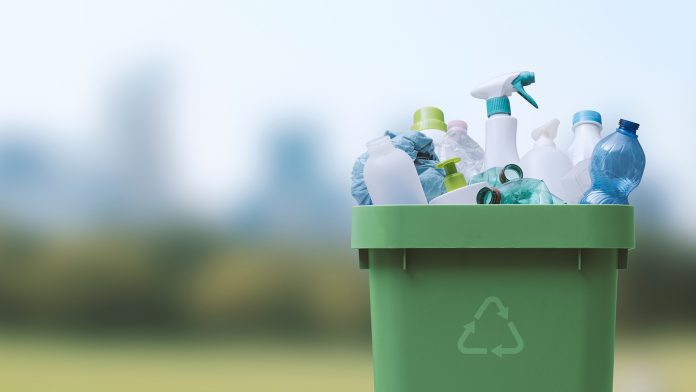The University of Manchester ‘One Bin to Rule Them All’ project team outline how implementing a new plastic recycling system in the UK could improve participation rates.
Our ineffectiveness at recycling plastic packaging waste is causing a significant environmental problem.
Of the 2.5 million tonnes of plastic waste generated in the UK in 2021, just 44% was recycled and over 60% was sent abroad, exporting the problem of plastic waste to countries that often do not have the ability to re-use or dispose of this waste sustainably.
Recent years have seen consumers bombarded with campaigns promoting the importance of recycling, in an attempt drive up participation rates. However, whilst the intention and effort of such policies are welcome, they have had little success.
And, as shown in a new report written by The University of Manchester’s ‘One Bin to Rule Them All‘ project team – which involves a cross-sector consortium of 25 industry partners and local authorities – the blame does not in fact lie with consumers, but with the convoluted nature of the recycling system.
Trialling a ‘one bin for all plastics’ system
Our research involved trialling a ‘one bin for all plastics’ system, which saw 30 households get a separate bin for all of their plastic waste for a two-week period.
This allowed the project team to explore how consumers engage with recycling, and showed that the blame levelled against households for poor quality recycling is largely misplaced.
Indeed, most households are eager to do the right thing, with numerous respondents demonstrating a willingness to go above and beyond to correctly dispose of their plastic.
So, what needs to change to make sure their efforts don’t go to waste?
Low recycling rates are driven by confusion over rules
The research found that the key driver of low recycling rates is confusion over rules as to what can and can’t be thrown away – and with an estimated 39 differing bin regimes currently in place across the UK, as well as 3,500 waste recycling plants with varying capabilities in infrastructure, it’s understandable why.

Described as a ‘postcode lottery’, this siloed and fragmented system has caused a lack of clarity over correct procedure, whilst the inability of some local authorities to process certain plastics holds back consumers from recycling what may be possible to recycle elsewhere.
Introducing a standardised approach to plastic recycling
A first step in tackling this would involve the adoption of a standardised approach to plastic recycling, to allow for a consistent method of waste management across the country.
Two years ago, the government outlined plans to do just that, by introducing nationwide consistency in recycling standards by October this year. However, in a new ‘waste prevention programme’ published in July, officials quietly confirmed that consistent recycling collections would be delayed until late 2025.
This is a huge blow. Introducing recycling consistency could create a platform on which the government can begin to effectively deliver the transition towards a circular economy of plastic waste, and these plans should be prioritised rather than kicked further down the road.
Crucially, it is worth noting that the onus does not lie solely on government or local authorities. Consistency in collection can only be truly effective if packaging designers and plastic producers adopt a large-scale, standardised approach to manufacturing.
Multi-material packaging is much harder to recycle
The 30 households involved in the ‘One Bin’ project trial disposed of a total of 5,800 pieces of plastic over the two-week trial period. Of this total, nearly half of the items collected consisted of multi-material packaging.
Made up of a combination of materials, these are much harder to recycle, with their inconsistency in composition meaning that a lot more plastic ends up in the general bin instead of being collected for reuse.
Maximising the recycling of such materials will involve simplifying their design and disposal. In this regard, delivering any real change would require broad adoption across sectors. This may take some time to co-ordinate, but it would pay dividends by increasing the amount of high-quality recycled plastic that can be used in packaging moving forward.
The research shows the willingness for change amongst consumers, but we need to ensure the infrastructure is in place to support this. The issue can no longer be ignored if the UK is to truly achieve its sustainability goals.
The University of Manchester’s ‘One Bin to Rule Them All’ project team
Dr Helen Holmes, Dr Maria Sharmina, Professor Michael Shaver, Dr Adeyemi Adelekan, Dr Kristoffer Kortsen, and Dr Torik Holmes.
Please note, this article will also appear in the fifteenth edition of our quarterly publication.









